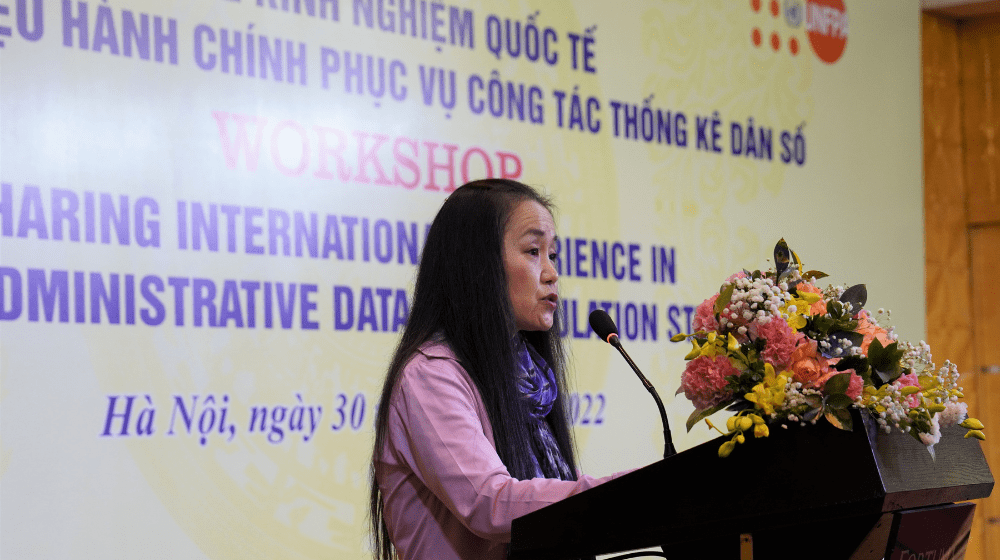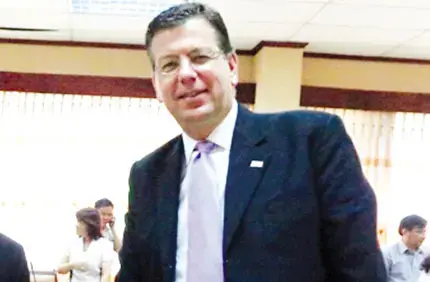- Ms. Nguyen Thi Huong, Director General, Vietnam’s General Statistics Office;
- International experts from Australia, South Korea, Denmark, Norway, Mongolia and Turkey;
- Officials from the Ministry of Planning and Investment, the Government Office, the Ministry of Public Security, the Ministry of Health, the Ministry of Justice, the Viet Nam Social Security, the Ministry of Construction,
- Colleagues from UN agencies and representatives from international organizations
- Media representatives.
It’s my honour to here today to co-chair this important workshop with Madame Nguyen Thi Huong, Director General of the General Statistics Office. I would like to take this opportunity to congratulate the General Statistics Office, and Madame Huong in particular, for such a strong commitment to modernising Viet Nam’s statistics system in order to generate, analyse and disseminate data, in line with international standards and best practices, for the country’s decision and policy making. This is the ultimate goal of the “Viet Nam Statistical Development Strategy 2021-2030 with the Vision to 2045”, which was approved by the Prime Minister a year ago.
Dear participants,
Vietnam is in the midst of rapid transformation for socio-economic growth. The country has been implementing the Socio-economic Development Strategy 2021 – 2030, the Socio-economic Development Plan 2021 – 2025, and the National Plan of Action to achieve the Sustainable Development Goals by 2030.
To date, no one can deny the important role that reliable data and statistics play for the development of the country. The availability of quality statistical data significantly influences how the government addresses the challenges, and what solutions can be explored, especially in relation to helping the most vulnerable population groups, including women, adolescents and youth, older people, ethnic minorities, migrant workers, and people with disability.
For most countries, including Vietnam, the population and housing census is the key pillar of the national statistical system, and a main source of information for developing, implementing, monitoring and evaluating national policies, strategies and programmes, and to allow for international comparisons.
However, the census counts everyone in country, and the process of doing so can cost quite high, and also, it can take a long time for data collection, verification, analysis and the production of the census report.
In the recent decades, to modernize a population census, reduce costs, and speed up the census management process, some countries have started using administrative data to produce census data. A register-based census employs administrative information from multiple registers through a matching process, typically using personal identification numbers.
A combined census enables some data to be retrieved from administrative sources, while other data are collected through field data, covering the entire population or a sample of the population. This new trend is increasing in the Asia-Pacific region: The percentage of countries reporting the use of the register-based or the combined census has increased from only 6% in the 2010 census round to 22% in the 2020 census round.
Dear participants,
Viet Nam’s first Census was implemented in 1979, four years after national unification, when all Vietnamese people were counted, not separated in the two halves of the North and the South. The last Census which was conducted in 2019, was remarkable as for the first time, advanced ICT technology was used in all Census phases, especially at data enumeration phase.
And this substantially helped improve the quality and transparency of data collected, shorten the time for data processing, reduce human errors, and disseminate census results within an excellent record of 7 months. UNFPA is proud to have supported Vietnam all the five censuses, especially in the 2019 one.
In the context of the 4th industrial revolution in Viet Nam, a widely application of digital technology as well as the use of administrative data or Big Data for censuses and other surveys has become a new strategic priority for the GSO. This has become even more important as the GSO is preparing for the Inter-Censal Population and Housing Survey in 2024 and other population surveys in the future.
Currently, Viet Nam has developed the national population database, managed by the Ministry of Public Security; sectoral databases, including the civil registration and vital statistics system, managed by the Ministry of Justice; and other administrative data sources by various line Ministries. International experience shows that where there is a robust, consistent, complete, and high-quality registers and administrative system, register-based census can be undertaken. Otherwise, combined census can be considered as a transition from traditional census to register-based census.
Given Vietnam’s level of various register systems, as well as the population size and rapidly evolving socio-economic growth characteristics of the country, it is important for GSO to examine experience and lessons learnt from other countries on how to use administrative data for the Census and population surveys.
This also helps Viet Nam in preparing for the transition from traditional to combined or register-based censuses, covering topics ranging from data availability to technological viability. UNFPA stands ready to support this course, as we have a shared goal of “Better Data, Better Lives” for Viet Nam.
Wish you all a successful workshop.
Thank you for your attention.




